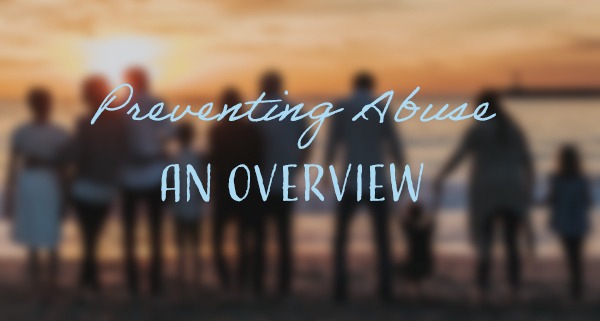Preventing Abuse: An Overview
They say, “It takes a village to raise a child.” Children need people around them to provide a safe, healthy environment, give them the security they need, and help them realize their hopes and dreams.
The entire village is needed to prevent child abuse. Parents, family members, neighbors, teachers, the church, and the community form a blanket of protection around a child and provide positive experiences. More people involved in a child’s life means more opportunities to see the potential for abuse and stop it before it begins.
Christian villages have a special reminder from Jesus regarding the care for children, “And whoever welcomes one such child in my name welcomes me” (Matthew 18:5-6). Jesus cared for children throughout his ministry and encouraged his followers to do the same.
You can protect the children in your village in four key areas.
Relationships
For healthy development, children need nurturing and supportive adults in their lives. This supports resiliency so they can overcome the lows in life and develop positive relationships.
The adults at church who interact with children have an opportunity to form a caring relationship with them. Sunday school teachers and youth leaders can be intentional as they develop relationships with the children in their care. Truly listening to their stories and offering encouragement are easy ways to do this. Lutheran elementary school (LES) teachers have a unique opportunity to build strong relationships during the school year. Teachers, staff and parents demonstrate support by talking to the children in their care outside the classroom.
Environment
Children need an environment that provides emotional security. They need basic needs met with access to safe places to play and interact with other children. Members of the village need to speak up when a situation is not safe.
Churches and schools must consider the spaces they use for children and teens. They should be warm and welcoming with plenty of light. They also need to be safe spaces. Read: Access your space for suggested safety measures to incorporate into classrooms.
Engagement
Social engagement is also critical to healthy child development. From celebrating family traditions to organized sports, children learn how to interact with others meaningfully. A village comprises many places, and each person can optimize their space to encourage safe interactions.
Churches and schools increase engagement when adults and teachers actively listen to children. This means listening and watching for non-verbal cues, asking open-ended questions to elicit more information, and withholding judgment and not being quick to speak.
Social-Emotional Growth
Children need to grow their interpersonal skills and learn social norms. The first step is learning coping skills and self-regulation.
The children who participate in church activities get to practice their interpersonal skills in a faith setting. The adults around them help them learn by modeling Christian living. This includes apologizing. We may fail to keep a promise or jump to an unkind conclusion. Children learn Christian behavior by seeing adults admit what happened and ask for forgiveness.
Preventing child abuse and neglect takes a village. Working together, we can provide children meaningful and safe experiences and create opportunities for them to develop emotionally, physically, and spiritually.
- Preventing Abuse: An Overview
- Preventing Abuse: Respite Care




